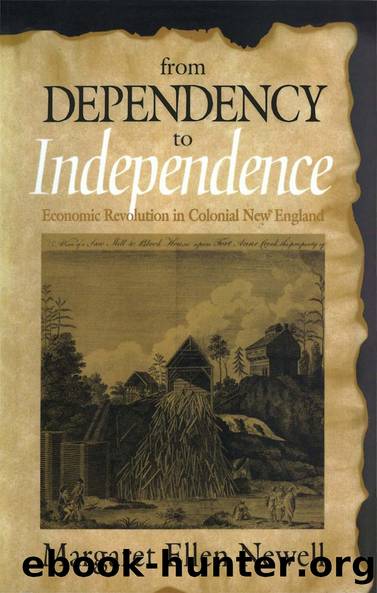From Dependency to Independence by Margaret Ellen Newell

Author:Margaret Ellen Newell [Newell, Margaret Ellen]
Language: eng
Format: epub
Tags: Nonfiction, History, Americas, United States, Colonial Period (1600-1775)
ISBN: 9781501700262
Publisher: Cornell University Press
Published: 2015-10-26T04:00:00+00:00
The title page John Wiseâs A Word of Comfort to a Melancholy Country (Boston, 1721). Courtesy of the Massachusetts Historical Society, Boston.
Colman pointed out that bank critics had exaggerated the extent of New Englandâs trade deficit with the mother country because they focused solely on direct exchange with England and ignored the carrying and plantation trades. The gap was nothing new. New Englandâs direct exports to the mother country had always been minuscule compared to its imports; it was through reexports, carrying, the coastal trade, and exchange with the Indies and Iberia that New England merchants made up the difference. âWhen did we Raise sufficient to Pay for our Import!â Colman demanded. âDoth not our Import from one place, pay for what we Import from another place? . . . Do we not Export one Commodity, and Bring in another; and then export that and Bring in another?â For Colman, this commerce justified even the export of silver, as it had for Thomas Mun a century earlier; indeed, he drew an explicit analogy between New Englandâs import-driven commerce and the trade which Mun had defended in the 1620s: the East India Companyâs export of coin in exchange for cottons, spices, and porcelains.5 The crude bullionism of those who decried trade imbalances and the outflow of coin ignored the complex realities of the Atlantic trade. Colmanâs more optimistic vision was closer to the truth; the invisibles of trade balanced New Englandâs accounts much more than contemporaries believed.6
Given this perspective on the reciprocal nature of trade, the notion of duties and prohibitions on imports struck bank proponents as disastrous. Autarky was simply not an option for colonial New England, noted one writer: âNo Country has within it self every thing Useful and conducive to the common Flourishing and Prosperity of its Inhabitants . . . . Providence has so Establishâd . . . [that] any particular Country . . . canât Flourish and be Prosperous, without such a mutual Communication of Goods.â7 Duties and restrictions would invite retaliation from other nations and raise prices at home, while a block on imports might harm the market for New England goods abroad. Either way, heavy-handed government policies would most likely divert Bostonâs trade to the competing ports of New York and Philadelphia.8 âThe way to make this Place Flourish,â concluded Colman, âis to make Trade as Easie and Free as possible and by encouraging every body to come to us.â9 Hollandâanother resource-poor maritime nation that had skyrocketed to commercial power through carrying and processingâserved as Colmanâs archetype of economic success and proof of his assertions, just as it had for a generation of English policymakers in the seventeenth century.
Up to this point, such writers as Wise and Colman had staked out positions regarding the balance of trade which, although distinctive, still fell within the boundaries of existing Anglo-American discourse. There was room in the balance-of-trade position for a qualified free tradism, the export of specie, and an appreciation of the complex, reciprocal nature of commerce.
Download
This site does not store any files on its server. We only index and link to content provided by other sites. Please contact the content providers to delete copyright contents if any and email us, we'll remove relevant links or contents immediately.
| 19th Century | 20th Century |
| Exploration | First Nations |
| Founding | Pre-Confederation |
| Province & Local | War of 1812 |
Cat's cradle by Kurt Vonnegut(15341)
Pimp by Iceberg Slim(14492)
4 3 2 1: A Novel by Paul Auster(12381)
Underground: A Human History of the Worlds Beneath Our Feet by Will Hunt(12093)
The Radium Girls by Kate Moore(12021)
Wiseguy by Nicholas Pileggi(5773)
The Fire Next Time by James Baldwin(5433)
Perfect Rhythm by Jae(5400)
American History Stories, Volume III (Yesterday's Classics) by Pratt Mara L(5302)
Paper Towns by Green John(5182)
Pale Blue Dot by Carl Sagan(5001)
A Higher Loyalty: Truth, Lies, and Leadership by James Comey(4955)
The Mayflower and the Pilgrims' New World by Nathaniel Philbrick(4497)
The Doomsday Machine by Daniel Ellsberg(4486)
Killers of the Flower Moon: The Osage Murders and the Birth of the FBI by David Grann(4445)
The Sympathizer by Viet Thanh Nguyen(4386)
Too Much and Not the Mood by Durga Chew-Bose(4341)
The Borden Murders by Sarah Miller(4316)
Sticky Fingers by Joe Hagan(4190)
